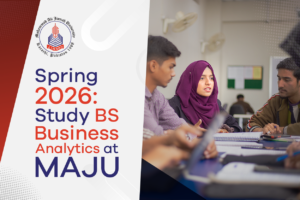Improve the Adaptability Skills

According to a LinkedIn post, one of the most demanded skills of 2024 states that despite AI being in demand and hype, it still cannot replace human skills. Similarly, McKinsey ranks ”adaptability” among the top 10 skills, highly demanded by employers. Muhammad Ali Jinnah University (MAJU) focuses on skill development, getting our students industry-ready, for the successful market-match and to win over the competition against the scarce opportunities. Therefore, in this article, you will know how to improve your adaptability skills.
What is Adaptability?
Adaptability is the willingness and ability to change yourself according to the situation’s requirements. In the ever-changing environment, the adaptability skill is the most beneficial one for any candidate.
In other words, adaptability also means the ability to master new skills as your work may require and demand. Flexibility, learning agility, resilience, problem-solving, open-mindedness, and communication skills are the essential factors of adaptability.
Six Types of Adaptability
There are the basic steps you can apply to any situation, for showing and practising adaptability. We have mentioned them in the following. Furthermore, you will need to showcase adaptability in the following 6 ways. You can also call these six types of adaptability.
- Cognitive adaptability
- Emotional adaptability
- Personal adaptability
- Interpersonal adaptability
- Problem solving
- Proactive learning
Either to Improve the Adaptability Skills or Flexibility?
Both are important skills for the workplace. However, these cannot be used interchangeably. As many of us may think and do! The accurate usage of flexibility vs adaptability depends on the circumstances. For instance, the flexibility is for short-term and immediate results. Whereas the adaptability is a continuous and ongoing, long-term game.
Why is Adaptability Important?
Adaptability is a crucial soft skill and equally important for social and work settings. Moreover, A PWC study of 2019 reveals 63% of CEOs struggle to hire talent adaptable to business needs, while Barclays LifeSkills found 60% of employers view adaptability as more crucial now than in previous decades.
Despite its importance, 44% of employees don’t recognise adaptability as a skill they have, and only 15% include it on their CVs—even though employers rank it as critical. Just 8% of employers provide adaptability training, highlighting a disconnect between valuing the skill and actively fostering it in staff.
This creates a greater gap between the market requirements and the candidate’s abilities. Therefore, it is very important and essential to improve your adaptability skills to move up and move fast in your career. The need for adaptability also multiplies in modern times, where traditional roles are replaced by the modern, non-linear and demanding roles.

How to Improve Adaptability Skills?
Now that you know, why is it important to develop the skill of adaptability in your personality? We, at MAJU, are looking forward to the easy, practical tips and strategies to help you improve your adaptability skills. However, make a continuous effort to make adaptability a second habit of yours.
This soft skill is not only helpful in the professional setting, but you will also benefit in your student life, in your academics. Let’s move forward!
- Identify your strengths & weaknesses
- Embrace the mindset of growth
- Be open to new experiments
- Show flexibility & kick your ego out of life
- Practice open-mindedness
- Accept & process feedback
- Be mindful and follow mindful practices
Expected Advantages After You Improve Your Adaptability Skills
Some of us are born with the ability to adapt! While others can improve their adaptability skills to win big in life. The small and easy steps are mentioned above. You can also follow these 19 strategies, shared by Forbes.
The gain or the benefit of doing something is the biggest motivator for human nature. Therefore, we will tell you the benefits you can get if you polish your adaptability skills.
- An adaptable individual is a happy and satisfied individual with improved self-confidence.
- Your ability to think critically and problem-solving improves dramatically with the improved adaptability.
- Improved adaptability increases your grit and resilience.
- Adaptability showcases the leader inside you.
- Workplace and life always demand something more, with adaptability, you would be able to adapt to the change and put that effort, which is the need of the hour.
- This all effort makes you a valued individual. Both in personal and professional settings.
- It helps you to move smoothly through conflicts in your academics, life, and workplace.
- Life is full of transitions and changes. Adaptability becomes your strength in times of change. Remember, everything changes, and to move through the change gracefully is the art of adaptability.
Conclusion
Adaptability is one of the most in-demand skills for 2024. In recent times, we need more people who are more open and accepting towards others and the changes we are going through. Therefore, it is essential to improve the adaptability skills over time, the best time is to start today. Since you are a student. The best time to become future-ready is to start today.



